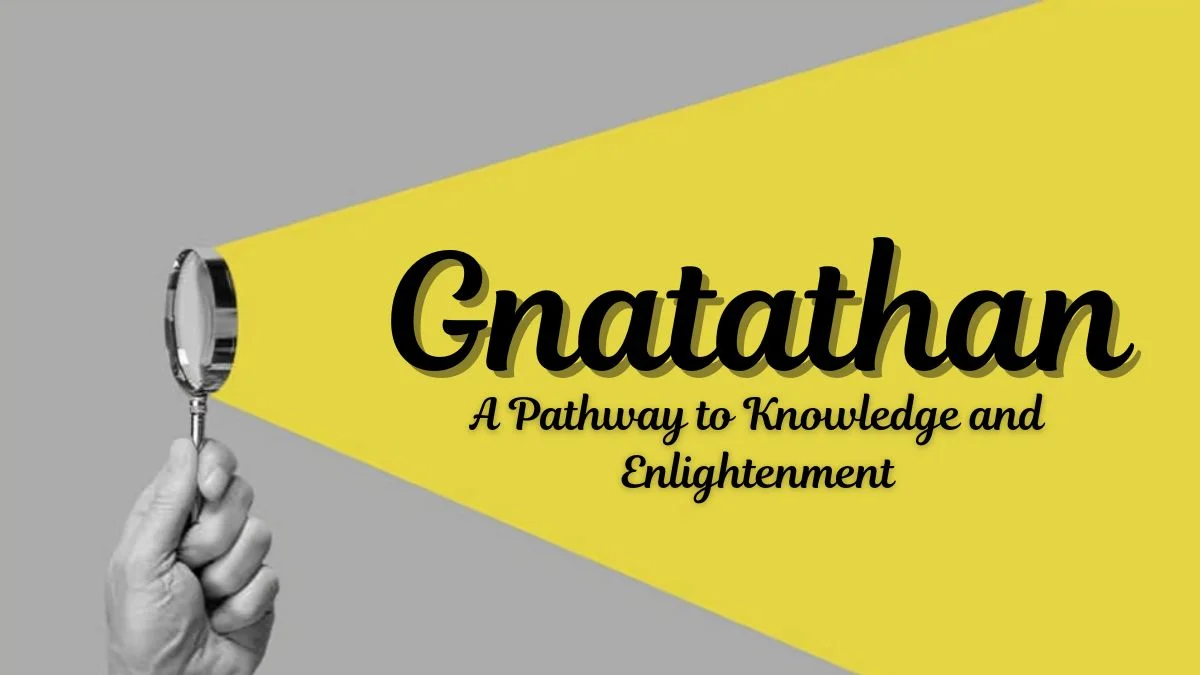EDUCATION
Exploring Gnatathan: A Pathway to Knowledge and Enlightenment

Gnatathan, derived from Sanskrit, combines “Gnata” (knowledge or understanding) and “Than” (place or state), signifying a “place of knowledge” or “state of understanding.” This concept emphasizes knowledge as both a destination and an evolving internal state. Rooted in Eastern philosophies, Gnatathan reflects the idea of wisdom and enlightenment as core pursuits of a fulfilled life. In Hinduism and Buddhism, Gnatathan represents the transformative power of understanding. It implies that the journey of gaining knowledge can lead to liberation, presenting knowledge as not just information but as a deeper awareness of life’s truths.
The Cultural Significance of Gnatathan in Eastern Philosophies
In Eastern philosophies, knowledge is considered a sacred journey to self-realization and enlightenment. This journey embodies this ideal by representing a state where knowledge transforms the individual. Hinduism and Buddhism emphasize wisdom, self-reflection, and mindfulness, viewing understanding as essential to personal liberation. Knowledge in these traditions is not only intellectual but deeply spiritual, intended to illuminate the true nature of self and existence. Gnatathan, therefore, holds significant cultural value, symbolizing a continuous path to self-awareness that connects individual growth with universal truths in Eastern spiritual teachings.
The Role of Knowledge in Hinduism
Knowledge in the Hindu philosophy is generic and sought after so that one can attain the fourth state of moksha. Hinduism, similar to some Christian scriptures, has what is called the Upanishad and the Bhagavad Gita which also attach importance to ‘Jnana’, spiritual knowledge in the process of spiritual development. This journey conforms with the Hindu belief in knowledge as a way to enlightenment. By sitting in contemplation, reading scriptures, and praying, self-reflectors learn about the world and the self. By means of this knowledge, they are free from the bonds of desire and are able to see the true, divine nature of all things. Gnatathan thus mirrors Hinduism in its beliefs of knowledge as a spiritual and other worldly experience.
Gnatathan in Buddhism: The Path to Enlightenment
In Buddhism, this journey resonates with the concept of enlightenment as the highest state of understanding. The Noble Eightfold Path emphasizes “Right View” and “Right Understanding,” crucial for overcoming ignorance and reaching Nirvana. Wisdom, or Prajna, is considered fundamental in the Buddhist journey, reflecting a deep comprehension of suffering, impermanence, and the nature of existence. this journey aligns with this Buddhist pursuit of enlightenment by symbolizing the importance of self-awareness and mindfulness. By fostering a clear and compassionate understanding, practitioners embody Gnatathan in their quest for spiritual freedom and enlightenment.
Spiritual vs. Intellectual Knowledge
- Spiritual Knowledge: Emphasizes self-awareness and inner truth, leading to enlightenment.
- Intellectual Knowledge: Refers to worldly information, skills, and facts that enhance material understanding.
- Gnatathan’s Focus: While intellectual knowledge has value, Gnatathan emphasizes spiritual knowledge that fosters self-realization and inner peace.
This distinction in Gnatathan highlights how Eastern philosophies value spiritual knowledge as an essential part of personal growth and liberation, beyond academic or professional pursuits.

Paths to Knowledge: How Gnatathan Reflects Diverse Spiritual Practices
The concept of this journey encompasses various spiritual practices designed to deepen understanding. These include meditation, self-reflection, and studying sacred texts. In Hinduism and Buddhism, meditation helps individuals gain insights into their thoughts and emotions, fostering clarity. Self-reflection encourages honest introspection, allowing practitioners to identify and overcome ego-driven attachments. Sacred texts guide seekers on ethical and spiritual matters, supporting the quest for enlightenment. These diverse methods provide paths to this journey, emphasizing that true knowledge is achieved through a combination of intellectual learning and experiential wisdom.
Meditation and Gnatathan: The Practice of Inner Knowing
Meditation is a cornerstone for achieving this journey, fostering an environment for inner clarity and insight. It encourages practitioners to observe their thoughts, emotions, and sensations, leading to a deeper understanding of the self. Techniques such as mindfulness and concentration practices help individuals quiet the mind, allowing them to access a more profound state of awareness. Meditation thus acts as a pathway to this journey, providing a space to explore and cultivate self-knowledge. By regularly practicing meditation, individuals can embody Gnatathan, moving closer to wisdom, peace, and liberation.
Comparing Gnatathan to Western Concepts of Knowledge and Understanding
Western philosophy traditionally emphasizes empirical knowledge and logical reasoning, whereas this journey is rooted in self-awareness and intuitive wisdom. In the West, knowledge is often pursued for practical applications or scientific understanding, focusing on the external world. In contrast, Gnatathan represents a journey inward, where knowledge is both transformative and deeply personal. This Eastern perspective on understanding aligns with self-realization and enlightenment. Both approaches offer valuable insights into the human experience, yet Gnatathan prioritizes spiritual development over intellectual achievements, viewing knowledge as a means to inner peace and liberation.
Gnatathan in Modern Spiritual Practices
Many modern spiritual practices integrate Gnatathan, emphasizing self-awareness, mindfulness, and inner peace. Yoga, mindfulness meditation, and spiritual retreats encourage people to explore their thoughts and emotions, helping them achieve a Gnatathan-like state. Digital platforms, online courses, and community-based spiritual groups make this knowledge accessible to a global audience. Today, many individuals use this journey principles to manage stress, improve focus, and cultivate compassion. These practices provide an entry point to self-discovery, aligning with the traditional Eastern vision of this journey and making it relevant to contemporary spiritual seekers.

Philosophical Reflections on the Concept of Gnatathan
For centuries, thinkers and religious personalities have attributed a quest for cognitive value to personal change, both in beliefs and identities. This journey personally represents this opinion through knowledge as a way to salvation. Within this context, knowledge is defined as a state as well as a process of a continuous learning experience. The Buddha for instance, believed that knowledge washed one clean from the suffering and hence attained enlightenment. On the epistemology of knowledge as liberation, this journey pushes the understanding of learning as knowledge acquisition as not only a mental exercise, but praxis or a path of becoming and transformation.
Challenges on the Path to Gnatathan
This journey is not without obstacles, as individuals face distractions, ego, and misinformation. These challenges can hinder the path to understanding, causing frustration and disillusionment. Maintaining focus and humility are essential for overcoming these barriers. Meditation, mindfulness, and ethical study help keep practitioners grounded in their pursuit. By recognizing and accepting these challenges, individuals can continue their journey with patience and resilience. Gnatathan’s philosophy teaches that obstacles are part of the journey, helping seekers refine their intentions and deepen their understanding.
Conclusion
Gnatathan offers a profound perspective on knowledge, encouraging individuals to view understanding as a path to inner peace and enlightenment. By integrating these principles into daily life, people can cultivate a deeper sense of purpose, compassion, and awareness. Through meditation, self-reflection, and a commitment to lifelong learning, one can embody Gnatathan’s ideals. Embracing this journey reminds us that true knowledge is transformative, guiding us toward wisdom and liberation. This journey ultimately encourages a life of growth and understanding, celebrating knowledge as a continuous journey toward enlightenment and fulfillment.
-

 BIOGRAPHY9 months ago
BIOGRAPHY9 months agoBehind the Scenes with Sandra Orlow: An Exclusive Interview
-

 HOME1 year ago
HOME1 year agoDiscovering Insights: A Deep Dive into the //vital-mag.net blog
-

 HOME1 year ago
HOME1 year agoSifangds in Action: Real-Life Applications and Success Stories
-

 BIOGRAPHY1 year ago
BIOGRAPHY1 year agoThe Woman Behind the Comedian: Meet Andrew Santino Wife




























